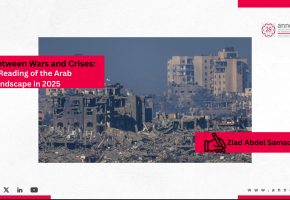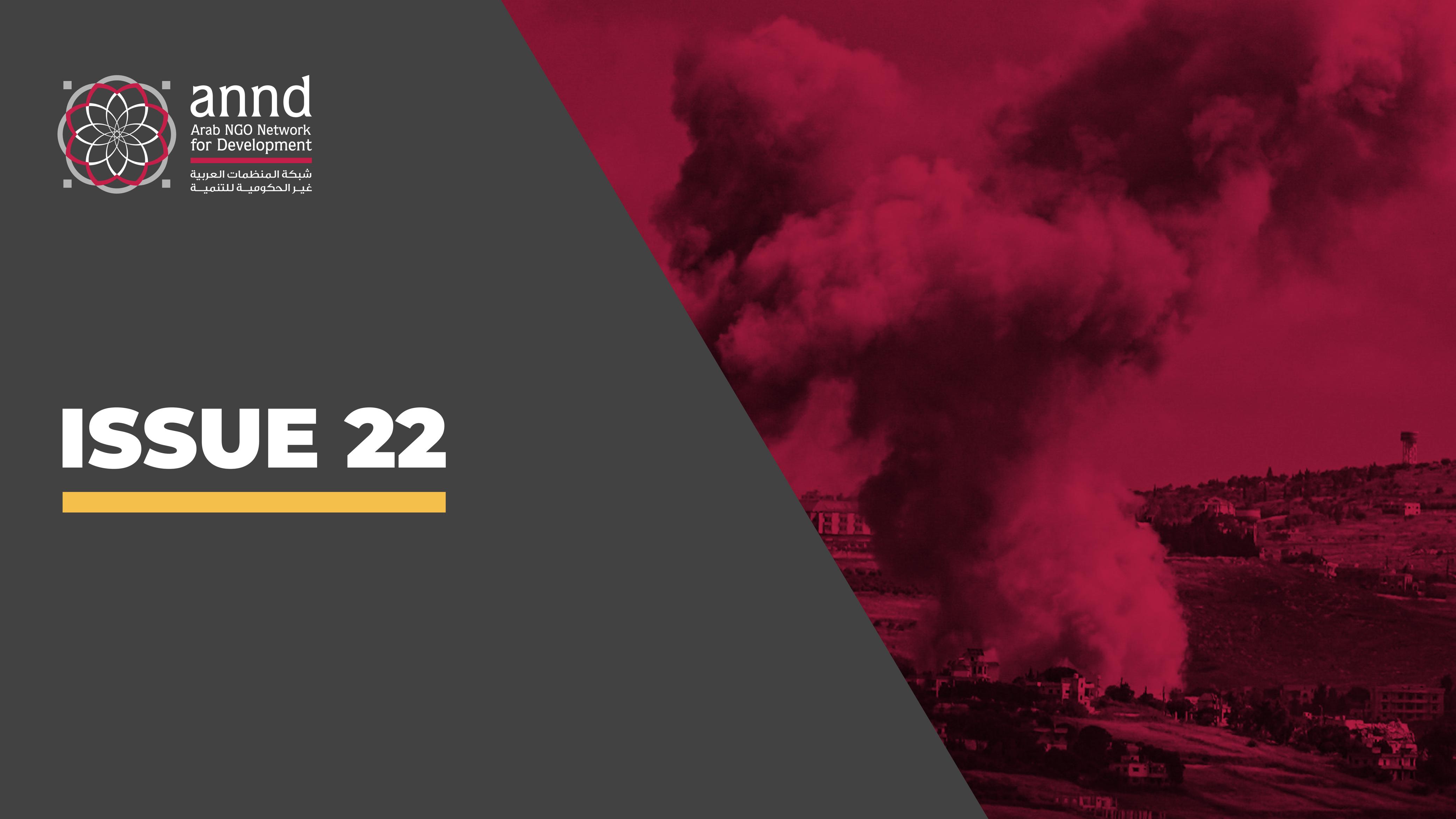
A Region on Fire
Issue 22 - October 18, 2024
Lebanese-Iranian Debate Over Interference in Internal Affairs
Tragic developments in northern Gaza
War in Gaza; The genocidal war carried out by the Israeli army in the Jabalia camp, isolated from the world, continues, using the weapons of starvation and bombing, and taking advantage of international silence.
Lebanon; For the first time, the Lebanese Prime Minister criticizes Iran’s behavior and calls for Lebanon to be distanced from regional axes. He also renews the call for the full implementation of UN Resolution 1701, while shelling and ground clashes continue in the south.

WHO: Israel is preventing medical organizations from entering Gaza, where everyone is dying from hunger
The Israeli aggression on Gaza continues into its 378th day, with the Israeli army conducting massacres in Jabalia in the northern part of the Strip, demolishing many buildings. Gaza’s civil defense stated they are unable to retrieve dozens of martyrs from under the rubble and along the streets.
The World Health Organization revealed that Israel has prevented medical organizations and specialists from entering to support clinics in Gaza. The WHO Director-General stated in a post on “X” on Thursday, “Almost everyone in Gaza is going hungry according to the latest assessment. This is inhumane”.
The WHO said since August, eight organizations and over 50 specialized personnel had been affected by Israel's blockade. These specialists were supposed to provide critical support to various medical services, as well as psychological assistance to healthcare workers in facilities such as Gaza’s European Hospital and Nasser Hospital.
The Gaza Ministry of Health published the latest statistics on casualties from the Israeli aggression on Gaza. It reported that Israel committed four massacres against families in Gaza, with 62 martyrs and 300 injuries arriving at hospitals within the past 24 hours. Many victims remain under the rubble or on roads where emergency and civil defense crews cannot reach them. The total toll of the Israeli aggression stands at 42,500 martyrs and 99,546 injured.
Israeli media reported that two soldiers were injured in a shooting near the Dead Sea by three gunmen who crossed from Jordan. The Israeli army killed two of them, while the third returned to Jordan.
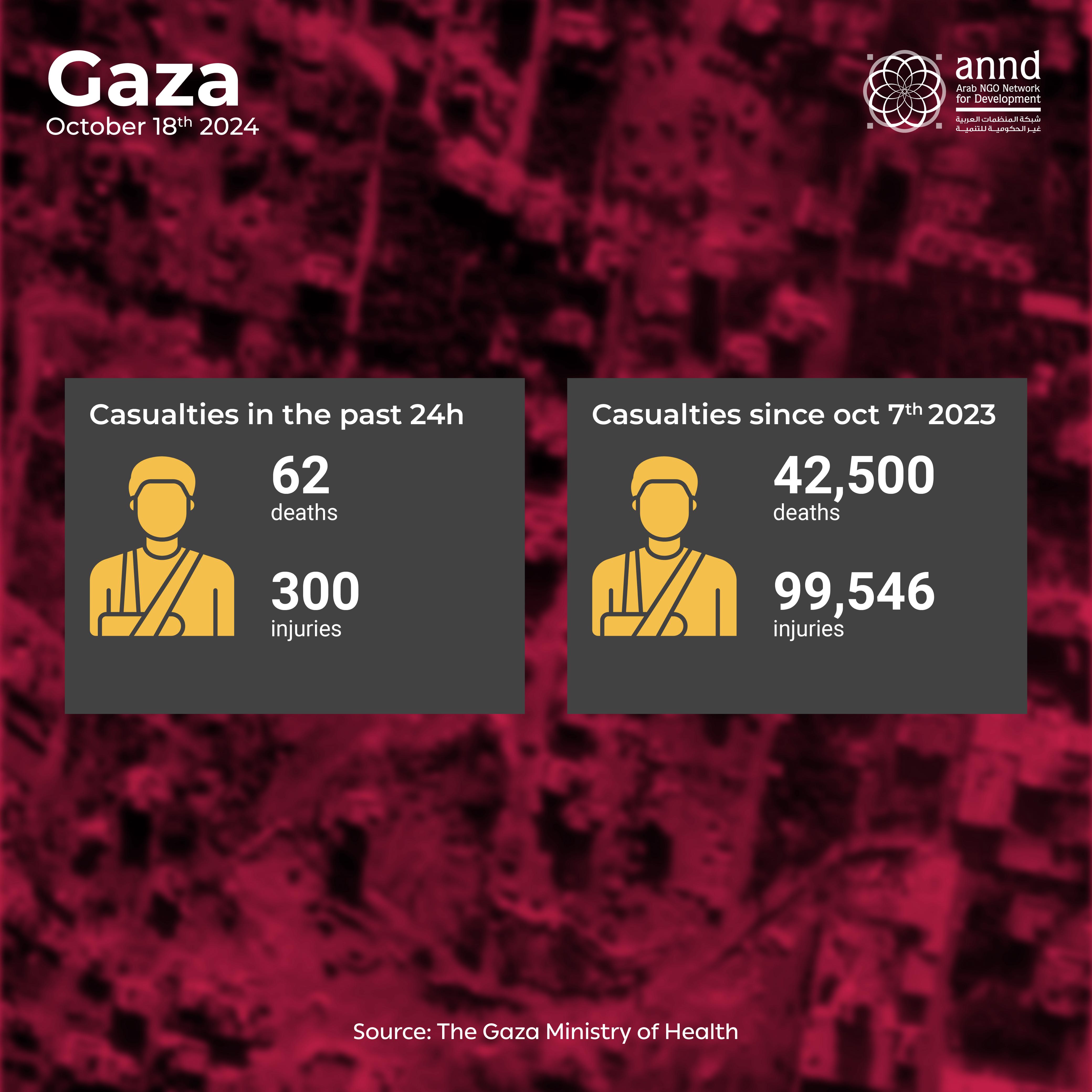
Battlefield Developments in Lebanon
The Israeli army continues its aerial invasion and systematic destruction, carrying out intense airstrikes indiscriminately on targets in southern Lebanon and the Beqaa Valley, alongside new warnings to evacuate 23 villages north of the Awali River. A new reserve brigade has been called up for operational duties in southern Lebanon. The army reported 53 injuries in the past 24 hours, including 50 at the Lebanese border and three in Gaza.
Hezbollah announced today that, following directives from its leadership, the Islamic Resistance Operations Room has entered a new, escalating phase in the confrontation with the “Israeli enemy,” which will be reflected in upcoming events. The statement also provided a detailed report on its ground, missile, air defense, and aerial operations.
The Lebanese Army’s Directorate of Orientation warned against the “psychological warfare” being waged by the Israeli army to incite and create conflicts among the Lebanese people by spreading rumors. The army urged people to be cautious of these plots, maintain awareness, and act responsibly, emphasizing its efforts to counter these hostile rumors and prevent conflicts.
Over the past 24 hours, 87 airstrikes and bombings have been recorded in various parts of Lebanon, mostly concentrated in the south and Nabatieh, bringing the total number of attacks since the start of the aggression to 10,333.
The Lebanese Ministry of Health issued a report detailing the toll of the past 24 hours, with six martyrs and 69 injured, raising the total number of casualties since the aggression began to 2,418 martyrs and 11,336 injured.
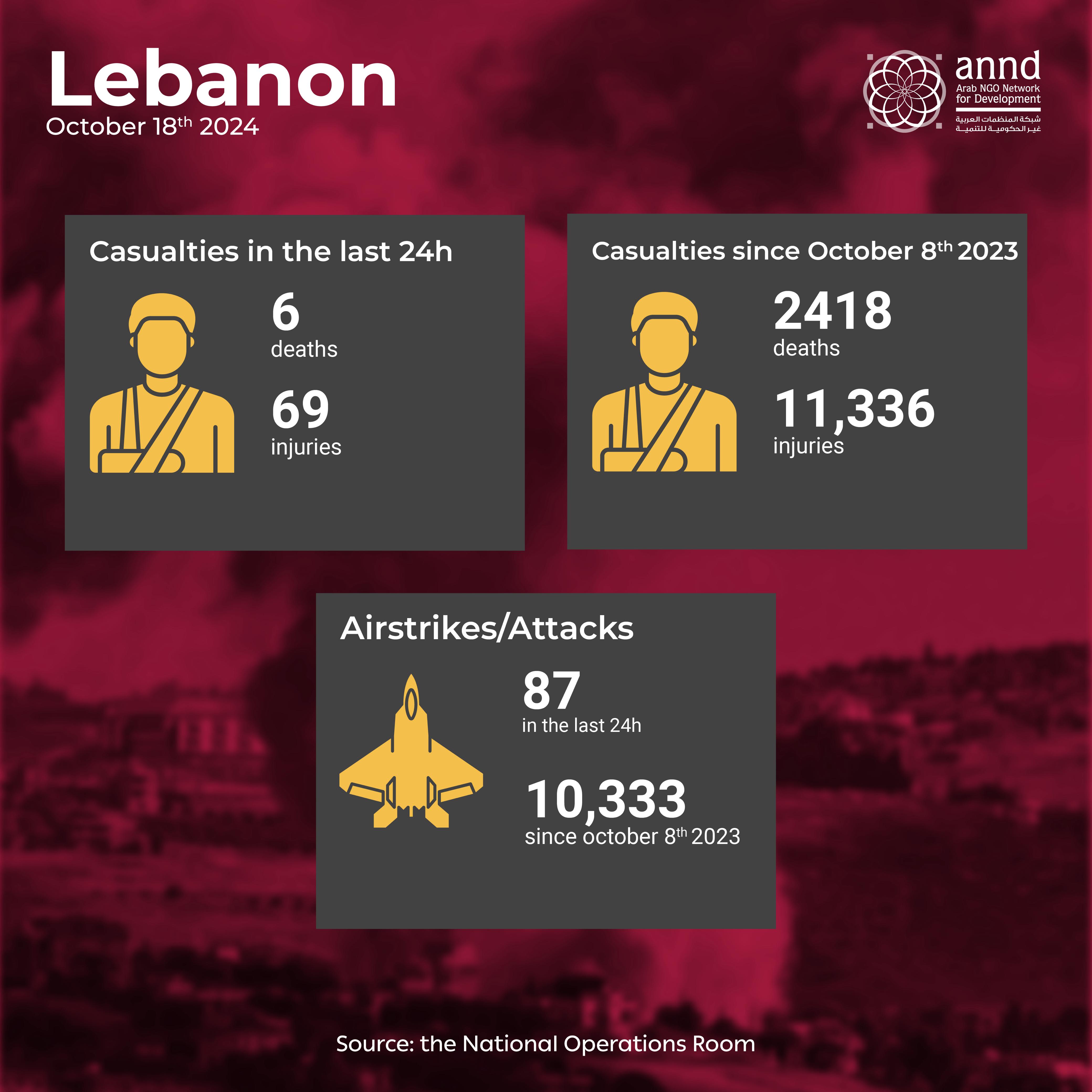
Political Positions in Lebanon
On Friday, Lebanese Prime Minister Najib Mikati said that he was "surprised" by the Iranian Parliament Speaker Ghalibaf's comments to the French newspaper “Le Figaro”, stating that Tehran is ready to negotiate with France over implementing UN Security Council Resolution 1701. Mikati said that this represents blatant interference in Lebanese affairs and an attempt to impose an unacceptable guardianship over Lebanon. He added that during recent visits by Iranian officials, they were informed of Lebanon’s situation, especially considering the unprecedented Israeli aggression.
Mikati asked the Foreign Minister to summon the chargé d'affaires of the Iranian Embassy in Beirut to inquire about the remarks. In a statement published on Friday, the Iranian parliament said the French paper's portrayal of Ghalibaf's remarks are “entirely inaccurate” regarding a ceasefire in Lebanon, affirming that Iran would support whatever the Lebanese government and resistance agree upon regarding a ceasefire.
Lebanese Speaker Nabih Berri responded to Israeli threats against him, stating that he is just one of many Lebanese facing the danger of aggression and that he is no different from any other Lebanese. “Martyrdom is a right,” he added, after a member of the Israeli Labor Party's Central Committee, Meir Masri, declared on X that “Nabih Berri is a legitimate target.”
Italian Prime Minister Giorgia Meloni visited Lebanon on Friday, marking the first high-level visit since the Israeli war against Lebanon began on September 23. Meloni had warned the Italian Parliament on Tuesday that withdrawing the UN peacekeeping force would be a “grave mistake,” after Israeli Prime Minister Benjamin Netanyahu called on UN Secretary-General António Guterres to end UNIFIL’s mission.
In a joint press conference with Meloni, Prime Minister Mikati called her visit a message of Italian support for UNIFIL’s mission in southern Lebanon, emphasizing that diplomacy should prevail over violence and destruction and that Israel must adhere to the ceasefire. He also affirmed Lebanon's readiness to strengthen the army's presence in the south in cooperation with UNIFIL, and he thanked Italy for its contributions to the peacekeeping force.
Meloni expressed her gratitude to UNIFIL soldiers for their role in achieving stability and peace, stressing that targeting them is unacceptable. She also emphasized the importance of implementing Resolution 1701 and highlighted the need for effective institutions to protect Lebanon’s interests, expressing Italy's willingness to support the Lebanese army.
Humanitarian Response
UNICEF issued a statement warning that children in Lebanon face increasing risks to their health and safety, including waterborne diseases such as cholera, hepatitis, and diarrhea, as ongoing bombing disrupts essential services.
The statement noted that at least 28 water facilities have been damaged by the conflict in recent weeks, affecting water supplies for over 360,000 people, mostly in southern Lebanon. However, the actual extent of the damage is likely larger, as technical teams cannot access many affected areas to assess the damage, deliver fuel, or make necessary repairs.
The report also indicated that several schools have been damaged by the shelling, along with at least 15 hospitals and 70 primary healthcare centers and emergency medical services. Six hospitals are out of service, and five others are operating partially, according to Lebanon's Ministry of Public Health.
According to the Lebanese government, an estimated 400,000 children have been displaced.
Minister of Health Firas Abiad stated at a press conference that "there are currently 233 primary care centers that provide health services to 788 shelters. Over the past two weeks, the ministry distributed to these centers from its warehouses in Karantina 1.6 million bottles of medicine, including 90 different types of acute and chronic medicines, like insulin.” He said the Ministry's plan for dealing with displaced people involves addressing those in shelters, while those outside can seek help at primary care centers.
He added that the existing stock of medicines for chronic diseases is "sufficient for about four or five months", and "imports are continuing — while thanking Middle East Airlines for "prioritizing health-related shipments to replace quantities, previously delivered by other airlines."
The displacement movement continues from areas subjected to daily attacks to safe areas, as the total number of registered displaced persons reached 191,501 in designated shelters (44,646 families), with the highest percentage of displaced persons recorded in Beirut and Mount Lebanon Governorate, but it is estimated that the number of displaced persons is much higher.
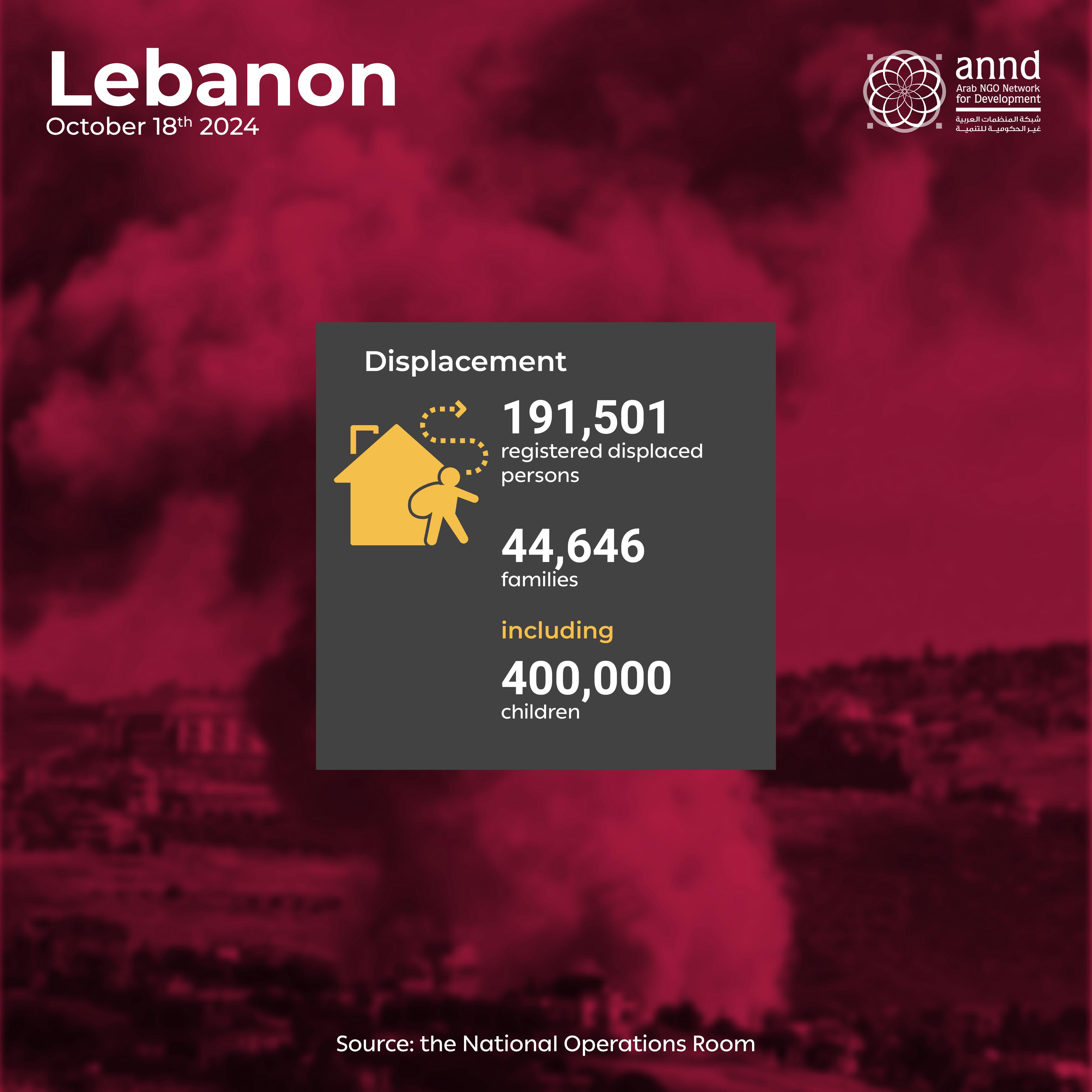
To date, 1,098 approved shelters have been opened to accommodate and receive displaced persons, and the number of approved shelters that have reached their maximum capacity has reached 902 centers.
From September 23 to October 18, 2024, the General Security recorded the crossing of 335,948 Syrian citizens and 135,181 Lebanese citizens into Syrian territory.
Minister of Social Affairs Hector Hajjar noted that the majority of displaced people living on the streets are Syrian nationals, and the Ministry submitted a proposal to the UNHCR ten days ago regarding their situation, awaiting a response.
Energy Minister Walid Fayyad estimated that $440 million is needed to provide minimum water and energy supplies, hoping to secure this amount at the International Conference in Support of Lebanon organized by France on October 24.
Minister of Public Works and Transport Ali Hamieh mentioned ongoing diplomatic efforts to ensure the safe restoration and reopening of the border road between Syria and Lebanon, which was bombed by Israel last week, to support the economy and facilitate the passage of Lebanese and Syrians leaving Lebanon by land.
The Higher Relief Commission announced that Pakistan’s ambassador handed over a 90-ton shipment of humanitarian aid from Pakistan’s government and people to Lebanon.
International Positions
UNIFIL spokesperson Andrea Tenenti described the destruction of many villages along the Blue Line in Lebanon as “shocking.” He confirmed that UNIFIL forces had been targeted several times, five of them deliberately, and mentioned that traces of white phosphorus were found near one of the bases months ago. When asked about the possibility of self-defense against Israel, he stated that it is possible but emphasized the importance of de-escalating tensions. He concluded by saying that UNIFIL’s 10,000-strong force remains in Lebanon with high morale.
Israeli Energy Minister reiterated that the gas agreement with Lebanon was a mistake and that he is exploring ways to annul it.
UN Secretary-General António Guterres said that the catastrophic level of hunger and risk of famine in Gaza is unacceptable.
The White House stated that U.S. President Joe Biden believes there is a rare opportunity for a ceasefire in Gaza following the killing of Sinwar, but the current situation does not allow for serious negotiations.
The U.S. Secretary of Defense said that American forces in the Middle East are ready to defend Israel's security.
The U.S. State Department said that the Middle East is going through a dangerous phase and urged all parties to avoid a full-scale war. It emphasized that the continuation of the war is not in Israel's interest and documented Sinwar's assassination as a significant military achievement, considering it an opportunity to advance negotiations on Gaza.
Russian President Vladimir Putin said that reaching compromises between Israel and Iran is possible, but it will be difficult to achieve. He announced that Russia is ready to participate in any talks between the two sides if they show interest.
The German Chancellor said that the killing of Sinwar should lead to a ceasefire in Gaza and the release of hostages.
Hamas Senior leader in Gaza, Khalil al-Hayya, in a speech mourning the head of the political bureau, Yahya Sinwar, stated that Hamas-held hostages will not return to Israel unless the war is stopped, complete withdrawal from the Gaza Strip, and all prisoners in Israeli prisons are liberated.
Reuters reported that the U.S. president is aware of the history and details of the response to Iran but will not provide any specifics. According to him, there is a possibility of working towards a ceasefire in Lebanon, but the situation in Gaza will be more challenging.
Recent publications
Jan 15, 2026

ANND Newsletter - 2025 in the Arab Region: Wars, Crises, and Civic Space Under Pressure
Jan 13, 2026
